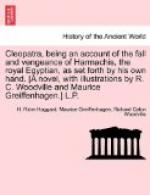“Woman,” he said, “whose is that child?”
“It is my grandchild,” she answered, “the foster-brother of the Prince Harmachis; the child to whose mother we owe this evil case.”
“Woman,” he said, “thou knowest thy duty, do it!” and he again pointed at the child. “I command thee, by the Holy Name!”
Atoua trembled exceedingly, because the child was of her own blood; but, nevertheless, she took the boy and washed him and set a robe of silk upon him, and laid him on my cradle. And me she took and smeared with mud to make my fair skin darker, and, drawing my garment from me, set me to play in the dirt of the yard, which I did right gladly.
Then the man hid himself, and presently the soldiers rode up and asked of the old wife if this were the dwelling of the High Priest Amenemhat? And she told them yea, and, bidding them enter, offered them honey and milk, for they were thirsty.
When they had drunk, the eunuch who was with them asked if that were the son of Amenemhat who lay in the cradle; and she said “Yea—yea,” and began to tell the guards how he would be great, for it had been prophesied of him that he should one day rule them all.
But the Greek guards laughed, and one of them, seizing the child, smote off his head with a sword; and the eunuch drew forth the signet of Pharaoh as warrant for the deed and showed it to the old wife, Atoua, bidding her tell the High Priest that his son should be King without a head.
And as they went one of their number saw me playing in the dirt and called out that there was more breeding in yonder brat than in the Prince Harmachis; and for a moment they wavered, thinking to slay me also, but in the end they passed on, bearing the head of my foster-brother, for they loved not to murder little children.




